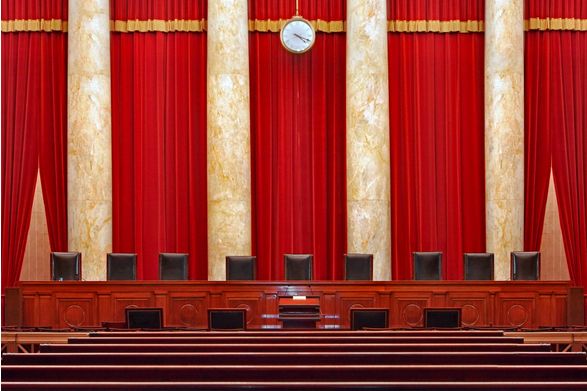Quote of the Day
Judges like Tigar have produced a system of legal roulette, where any opponent of a president can simply shop around for the friendliest courts from which to challenge all of the federal government’s policies.
Have you been amazed, and perhaps angered, that any obscure judge you’ve never heard of can halt a policy of a duly elected president simply by issuing a nationwide injunction?
Yesterday, the practice of nationwide injunctions took a small hit.
The U. S. Supreme Court ruled that a federal judge in San Francisco cannot block the Trump administration’s new policy on asylum seekers by issuing a nationwide injunction.
The new asylum policy states that migrants who travel through Mexico must apply for asylum there and be denied before applying in the U.S. It will cut down on spurious claims. We’ll hear more about this policy, but yesterday the Supreme Court did address one incident of government by injunction.
The judge is U.S. District Judge Jon Tigar, and this is the second time he has tried to block administration policy. In fact, the nationwide injunction is becoming the favored tool for thwarting policies with which the left disagrees. The Obama administration faced 20 of these injunctions, but the Trump administration already has seen 40.
Attorney General William Barr explained a few day ago in the Wall Street Journal why these nationwide injunctions should have no place in our system of government:
Under Article III of the Constitution, courts are supposed to apply the law to the parties before them—not to thousands or millions of third parties. The Framers rejected the idea that the courts should act as a “council of revision” with sweeping authority to reach beyond concrete controversies and rule on the legality of actions taken by the political branches. Moreover, the power of federal courts to issue injunctions derives from English practice, which allowed courts to restrain a defendant to the extent necessary to protect the rights of the plaintiffs in the case. Nationwide injunctions are a modern invention with no basis in the Constitution or common law.
Nationwide injunctions are also inconsistent with the mechanism the law recognizes to provide relief to nonparties: a class action, in which class members are bound by the result, win or lose, unless they opt out. Nationwide injunctions, by contrast, create an unfair, one-way system in which the democratically accountable government must fend off case after case to put its policy into effect, while those challenging the policy need only find a single sympathetic judge.
Berkley law professor and AEI scholar John Yoo writes this morning on Fox:
Nationwide injunctions like the one issued by Tigar short-circuit our political system, blocking Congress and the president from carrying out their legitimate functions.
Such nationwide court orders by a single district judge destroy the careful organization of our justice system, which creates layers of appellate and Supreme Court review so that the federal judiciary can carefully consider all possible arguments and facts when it reaches a decision.
The Supreme Court should combat this end-run around the normal justice system by making clear that a district judge can only issue judgments that bind the parties within the geographic territory of his or her district.
The Trump administration and Congress should also amend the law governing federal courts to eliminate the misinterpretation of a judge’s powers. If the Supreme Court does not use this case as the opportunity to narrow injunctions, a single district court judge will be able to block the federal government from carrying out its constitutional functions. That is not what the framers of the Constitution intended.
Barr notes the perhaps most catastrophic use of the nationwide injunction: the DACA injunction. The Obama administration declined to enforce the law regarding Deferred Action for Childhood Arrivals. When the Trump administration announced that it would enforce the law, a compromise was in the offing. A judge in San Francisco issued a nationwide injunction. It made the situation worse:
Far from solving the problem, the DACA injunction proved catastrophic. The program’s recipients remain in legal limbo after nearly two years of bitter political division over immigration, including a government shutdown. A humanitarian crisis—including a surge of unaccompanied children—swells at the southern border, while legislative efforts remain frozen pending Supreme Court resolution of the DACA case.
The nationwide injunction seems to have been designed by people who want what they want and are determined to get it, even if it means re-inventing our system of governance to please them.


